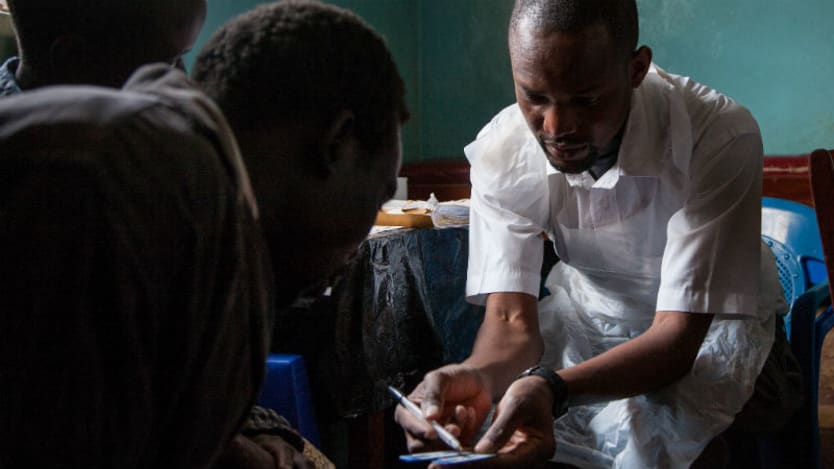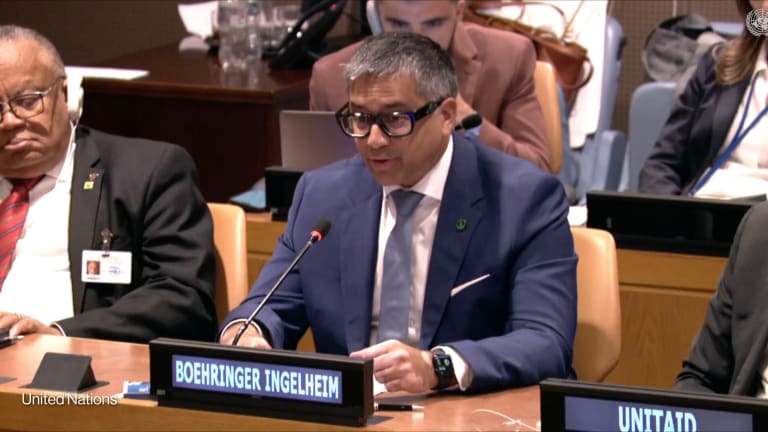
Advancements in health and science and a sea change in policy priorities over the past decade have made it possible to believe that an end to the HIV epidemic might be in sight. HIV has been one of the worst killers in history, infecting more than 70 million people worldwide and killing 35 million.
Yet today, we are at a crossroads, and it is clear that to truly help extinguish this disease, we must acknowledge the simmering crisis undermining many HIV efforts: the global shortage of skilled, trained health workers.
Today, there are not enough doctors, nurses, midwives, and frontline health care workers to address the burden of HIV, let alone the growing burden of noncommunicable diseases. In Malawi, for example, there are only about two physicians for every 100,000 people; in the United States, there are close to 257 physicians for every 100,000 people. However, without increased investment, the projected shortage will grow to 18 million by 2030, hurting primarily those in low- and middle-income countries where the HIV burden is highest.
Sadly, the recognition of this profound need is shockingly old. In 2011, the Institute of Medicine released its report, “Preparing for the Future of HIV/AIDS in Africa: A Shared Responsibility.” It highlighted that solely investing in treatment will not be enough to end the epidemic in many sub-Saharan African countries, where HIV incidence, prevalence, and mortality are the highest in the world. The report emphasized the importance of strengthening health systems by investing in human resources for health. This report was not novel, but rather added to the many other studies before and since that have indicated the need to invest in human resources for health to eliminate HIV in sub-Saharan African countries. Somehow, this evidence is not enough and we continue to see the shortage of trained health workers prevail.
However, the fact is people are at the heart of a health system. Trained, skilled professionals can change the quality of care for patients dealing with a multitude of health conditions, particularly those suffering from HIV. Further, these same workers can train their successors and colleagues, and — also critically — can become leaders and agents of change for the health systems in their country. Local leadership will be essential to building any lasting, contextual solution and with the local ownership and commitment necessary to support sustainability.
At Seed Global Health, which helps to train health professionals in areas of need, we endorse this approach. We have seen how through academic partnerships and effective training, rising health professionals can learn best practices to prevent, diagnose, and treat patients who are HIV-positive. In Seed’s very first year of placing educators, Dr. Martin Neft, a physician trainer working in Tanzania, saw an unresponsive and very ill patient. He was told the patient was six months pregnant, HIV positive, had a stroke, and was beyond hope.
Dr. Neft, however, broadened the differential diagnosis and investigated the possibility that the patient might have toxoplasmosis, an infection common in HIV positive patients, which can mimic a stroke. After appropriate treatment, the patient woke up and went on to deliver a healthy baby. But the real success came months later when Dr. Neft watched as one of his medical students successfully diagnosed toxoplasmosis in a similarly presenting patient.
We know HIV can be managed through proper prevention, diagnosis, treatment, and chronic disease care, but without skilled health professionals across multiple disciplines such as obstetrics, pediatrics, and family medicine, critical HIV education, treatment, and management is impossible to provide.
Dr. Neft’s story is just one of what could be thousands of positive stories, which would in turn impact millions of lives. By investing in the training of skilled providers in multiple disciplines — all of which touch HIV — we can help prevent many HIV infection in the first place, provide high-quality care when it is diagnosed, and ensure that millions don’t die of a disease we know we can beat. If we are to see a lasting change in the fight against HIV, we must focus on strengthening the core infrastructure of a health system: its people.








